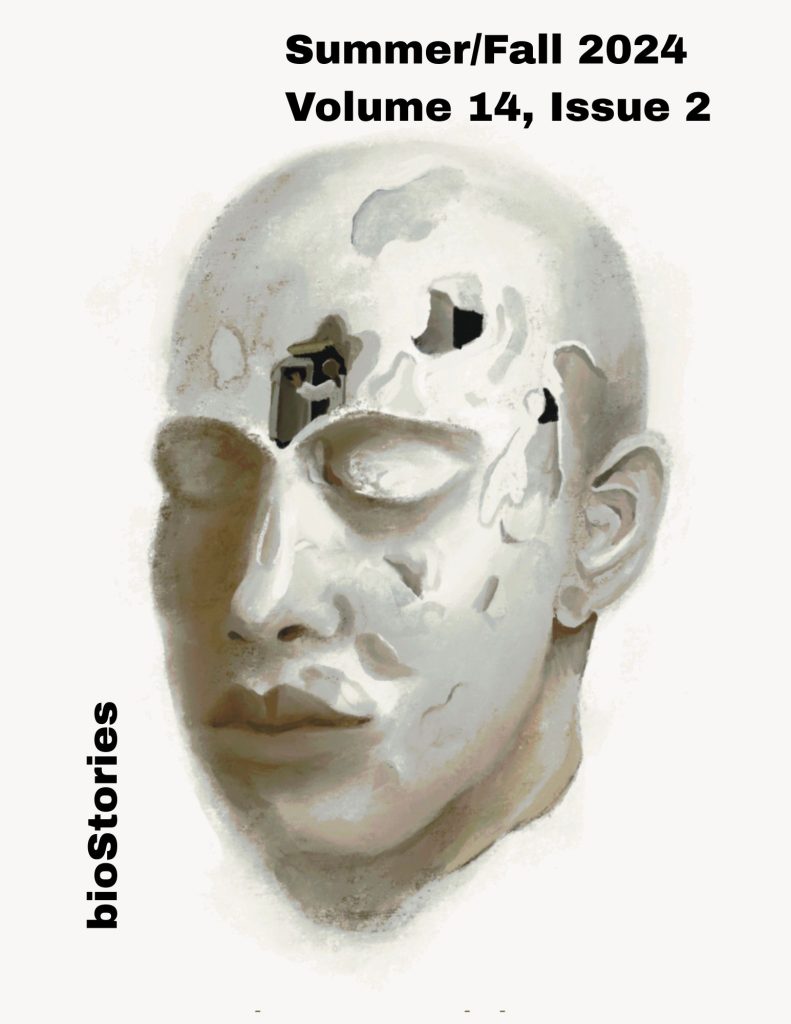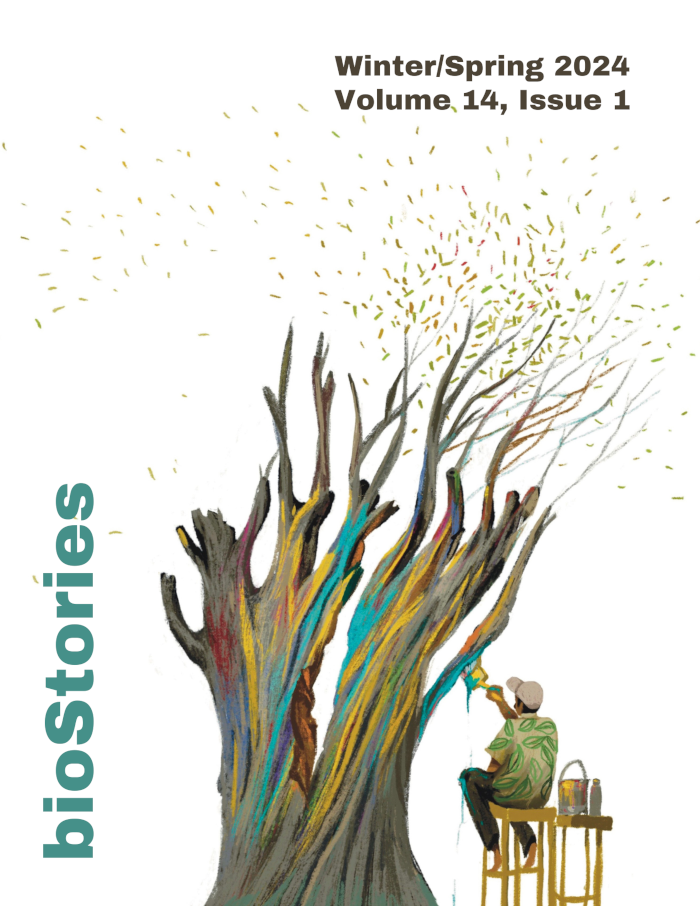We feature new essays every Wednesday. Make it a habit to return for new content. You’ll find links to our most recent essays below and more on our contributors page. Thanks for reading. If you enjoy the work we present on bioStories, please share pieces you’ve valued with your friends.
This week: When a woman suffers a first epileptic seizure while revisiting a cherished family mountain house loaded with childhood memories, she begins to wonder if she can ever again disassociate illness with place. And she explores if relationship to place and the natural world of which it is part can influence healing.
Weekly Featured Essay
The Blue House in the Hemlocks
by Katherine Casey
It was July seventh and I was visiting my mother’s home deep in the trees of northeastern Pennsylvania, the house where I had spent the summers of my childhood, a blue home surrounded by hemlocks, draped in the smell of moss and mildew. It was damp, always. Towels never dried and swimsuits draped over racks dripped lake water into small pools on linoleum floors. You had to watch your feet; one wrong step could send you flying.
That weekend my husband Jon and I spent mornings on the uncovered porch where potted basil and geraniums bent their faces towards the sun. I ran on red dirt roads until my ankles were caked with mud that also streaked my calves. In the evenings mosquitoes and moths, attracted by the light, battled the mesh of our screened porch. My family ate late dinners: plates of grilled corn, peach salad, and ribs that my brother had smoked all day. As a vegetarian I didn’t eat the ribs but I loved the magic of my brother’s presentation: a labor of love drawn hopefully from the fire and presented to faces that smiled at the miracle of patience, sustenance, and woodsmoke. I have always loved small miracles.
The days with family were lovely, but not idyllic. There were dirty dishes and too many shoes. There was drama to unpack: which member of the family wasn’t speaking to another and why; whose husband was an unbearable asshole; who had finally lost the weight. I arrived exhausted, burnt out from six impossible months at work. I had been sick three times in the past four months and there was no amount of sleep that could bring me back to myself. Still, if there were ever a place to be tired with my entire being, the blue house in the hemlocks is the place I would have chosen. It was where I had been free as a child, the place I still held in my mind’s eye when I needed to steady my nerves, and the place I had most wanted to show Jon when we first started dating. It was the place where I slept the deepest.
READ MORE
MORE ESSAYS
Soup-hound Tales
by Sharman Ober-Reynolds
My father named our first dog Soupy, short for Soup-Hound. Dad was an orphan, and to him, the only kind of dog food was leftovers. And leftovers in the 1960s were tuna noodle casserole, pork chops with mushroom gravy, chicken with rice, all made with a can of Campbell’s soup. Soupy was a mix of cocker spaniel, dachshund, and Airedale Terrier, definitely not a designer hybrid. She had more of a Frankenstein vibe. Because of her long torso and short legs, sitting involved rolling around several times, like a kid’s blow-up bop bag, before she settled askew on one of her haunches. Still, Soupy was an extraordinary dog, bossy and demanding of attention, comforting in her very presence. And she was ours.
My parents were unprepared when she went into heat. Mom refashioned my underwear by cutting a hole for Soupy’s tail and used safety pins to secure them around her hindquarters to catch her bloody discharge. Before we could get her to the vet to be spayed, an amorous beagle tunneled under our fence and made whoopee with Soupy. When we chased him away, he howled with longing.
The Scottish Play
by Naomi DeMarinis
The IV line that ran from a bag on a hook to the port in my chest was filled with arsenic trioxide, an inorganic compound originated from the supernova of a dying star at least fifty times the mass of the sun. My illness, acute promyelocytic leukemia, resulted from the mutation of two of my chromosomes which happens for no known reason to approximately two out of a million people each year. A right-sized star fused itself through the elemental table, and the remnants of its death became my medicine. The translocation of chromosome 17 and chromosome 15 nearly killed me before I knew I had cancer. The relational lattice between me and the star was made of spacetime and a near-perfect vacuum. The relational lattice between me and my disease was made of a lifetime of anticipatory dread and knocking wood against the statistically improbable. Spacetime, vacuum, and dread walked into a beige-painted chemo lounge, and that big dead star and I were in the same room.
Rocket 88
by Sydney Lea
A few weeks ago, one of our grandsons, nine years old, stepped away from the clamor of a family gathering and walked straight up to me. His preoccupied look told me something was on his mind. I bent to listen, the power of my two hearing aids not a match for the collective chatter. He was asking me a question, but uncertain I’d gotten it rightly, I told him to repeat it. “Grandpa, what’s an Oldsmobile?”
I simply answered that an Oldsmobile was a car that’s not produced anymore. I immediately wondered why the question had occurred to the boy in the first place but before I could ask, he rushed back to be with his little brother and cousins. Distracted myself by plenteous, beloved company, I didn’t get around to pursuing the matter that afternoon.
Then suddenly everyone was gone.
FedEx: When You Absolutely, Positively Need That Third Job
by Patrick D. Hahn
Sparrows Point, Maryland, late summer, mid-afternoon. This area once was the home of Bethlehem Steel, but its glory days as a manufacturing powerhouse are long gone. Now it serves as a hub for the distribution of products made somewhere else.
The sun is shining brilliantly outside. Today would be a perfect day for young lovers to go strolling hand in hand along the beach, through the park, or along the Harborplace, but none of that is in the cards for me. I’ve just gotten off my other job (well, one of my two other jobs) as a college lecturer, and now I’m reporting for work at FedEx Ground.
After more than thirty years of teaching undergraduate courses in biology (like most of us doing the actual work of teaching), I still am employed on a part-time, short-term basis, with contracts stipulating I can be gotten rid of at any time, for any reason. (Actually, most of us “part-timers” teach more than the “full-timers,” but never mind that for now.) This is a scam of which the students are almost completely unaware. Sweatshop conditions for the teachers, crushing student loan debt for the students—this has become part of the new normal. And this explains my never-ending search for side jobs that work around my teaching responsibilities.
The Gymnast
by Mark Lucius
The night was made for boredom, but boredom would not prevail. We three high school seniors, nary a wise man among us, traveled to a neighboring school fifteen miles from our southeastern Wisconsin town—looking to fill an empty Friday night in February 1970.
Another Friday, we might have watched basketball, gone to a party, played a few hours of poker with friends. Something we liked better. But all that February night offered was a wrestling meet away from home. A classmate excelled at the sport, so we went to cheer him on. He won, the meet ended, and we left the brightly lit gymnasium for home.
None of us could have guessed that soon, we’d be gambling with our lives.

